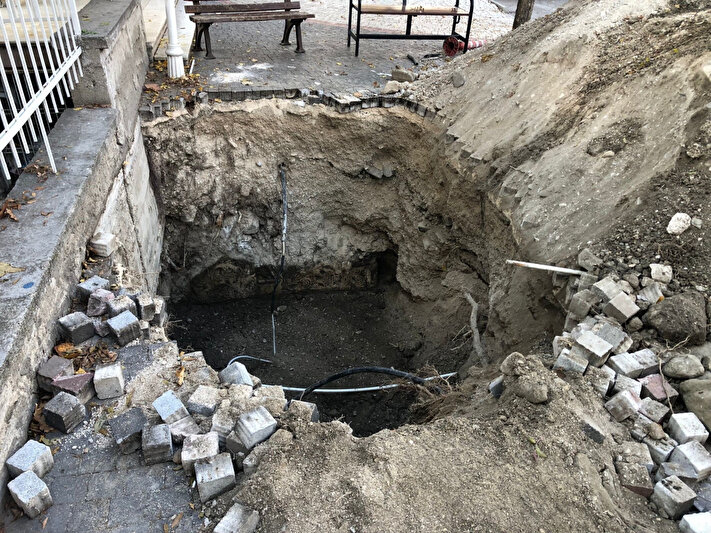Four men posing as municipal workers in Turkey’s western Isparta province were detained after damaging utility lines during an illegal excavation that revealed fragments of an ancient sarcophagus and pottery, Gazete Duvar news website reported.
Authorities have detained four individuals who masqueraded as municipal employees to conduct an illegal excavation late at night, damaging vital electricity and natural gas infrastructure in the process. The incident, reported by suspicious residents of the area, has brought attention to the rampant issue of looting cultural heritage items in Turkey.
The suspects, identified as Halis T., Hacı D.C., İsmail A., and one unnamed individual, arrived in a neighborhood with a backhoe and began digging on a sidewalk. Claiming to be conducting municipal work, they raised suspicion when residents noticed the excavation was being conducted during unusual hours and without proper safety measures. A police investigation revealed that the men were not authorized municipal workers.
The Isparta Museum took possession of fragments of a pottery jar and pieces of an ancient sarcophagus found at the site. The excavation area was then filled in after an official inspection.
Speaking to Gazete Duvar, local shopkeeper Murat Urköse, who witnessed the excavation, recalled a history of treasures found in the area. “Years ago, during the demolition of the Mehmet Mosque nearby, many coins were discovered. Patterned stones were also seen at the site. They might have believed there was treasure hidden there,” he said.
The incident is part of a broader issue of treasure hunting in Turkey, where the country’s rich archaeological heritage is increasingly targeted by looters. Illegal excavations, often driven by myths of buried riches left by previous civilizations, destroy historical artifacts and sites.
In Turkey, ancient artifacts are frequently unearthed during construction projects or treasure hunts, revealing items such as coins, metalwork and pottery from different epochs, including the Roman, Byzantine and Ottoman eras. Treasure hunting has surged amid a period of economic hardship, with inflation and unemployment rates driving many to engage in unregulated digging for valuables.
Turkey’s archaeological wealth, spanning millennia of civilization, is under threat from looters exploiting lax enforcement of cultural preservation laws. Treasure hunters target Armenian churches, Byzantine sites and Ottoman-era graves, often causing irreversible damage. Experts warn that these activities not only harm Turkey’s cultural heritage, but also fuel the global black market for antiquities.
Although Turkey has laws to regulate excavations, enforcement remains inconsistent and penalties for illegal digging are minimal. The government’s focus on preserving Islamic heritage over other cultural histories has exacerbated the neglect of sites associated with non-Muslim communities, such as Armenian and Greek ruins.
